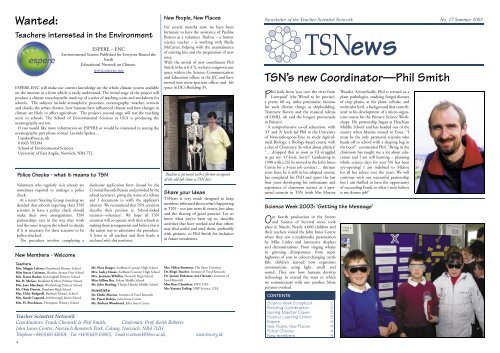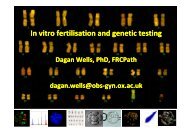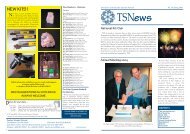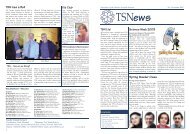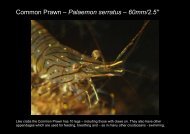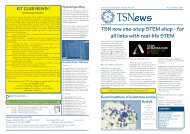TSNews 17 - Teacher Scientist Network
TSNews 17 - Teacher Scientist Network
TSNews 17 - Teacher Scientist Network
You also want an ePaper? Increase the reach of your titles
YUMPU automatically turns print PDFs into web optimized ePapers that Google loves.
Wanted:<br />
<strong>Teacher</strong>s interested in the Environment<br />
Volunteers who regularly visit schools are<br />
sometimes required to undergo a police<br />
check.<br />
At a recent Steering Group meeting we<br />
decided that schools requiring their TSN<br />
scientist to have a police check should<br />
make their own arrangements. TSN<br />
partnerships vary in the way they work<br />
and the onus is upon the school to decide<br />
if it is necessary for their scientist to be<br />
police-checked.<br />
The procedure involves completing a<br />
New Members - Welcome<br />
<strong>Teacher</strong>s<br />
Mrs. Maggie Lefever, Neatishead Primary School<br />
Miss Stacey Coleman, Heather Avenue First School<br />
Mrs. Karen Barker, Kenninghall Primary School<br />
Ms. D. McGee, Rockland St Mary Primary School<br />
Mrs. Jane Marchant, Winfarthing Primary School<br />
Mr. Chris Derrett, Reepham High School<br />
Mrs. Vicky Redgwell, Banham Primary School<br />
Mrs. Sarah Coppard, Attleborough Junior School<br />
Mrs. H. Brockman, Thompson Primary School<br />
<strong>Teacher</strong> <strong>Scientist</strong> <strong>Network</strong><br />
Coordinators: Frank Chennell & Phil Smith, Chairman: Prof. Keith Roberts<br />
John Innes Centre, Norwich Research Park, Colney, Norwich, NR4 7UH<br />
Telephone +44(0)1603 450304, Fax +44(0)1603 450015, Email ts.network@bbsrc.ac.uk,<br />
4<br />
ESPERE – ENC<br />
Environmental Science Published for Everyone Round the<br />
Earth<br />
Educational <strong>Network</strong> on Climate.<br />
www.espere.net<br />
ESPERE-ENC will make our current knowledge on the whole climate system available<br />
on the internet in a form which is easily understood. The initial stage of the project will<br />
produce a climate encyclopaedia made up of a series of teaching units and worksheets for<br />
schools. The subjects include atmospheric processes, oceanography, weather, aerosols<br />
and clouds, the urban climate, how humans have influenced climate and how changes in<br />
climate are likely to affect agriculture. The project’s second stage will test the teaching<br />
units in schools. The School of Environmental Sciences at UEA is producing the<br />
oceanography section.<br />
If you would like more information on ESPERE or would be interested in testing the<br />
oceanography part please contact Lucinda Spokes…<br />
l.spokes@uea.ac.uk<br />
01603 593394<br />
School of Environmental Sciences<br />
University of East Anglia, Norwich, NR4 7TJ.<br />
Police Checks - what it means to TSN<br />
disclosure application form (issued by the<br />
Criminal Records Bureau and provided by the<br />
school secretary), giving the name of a referee<br />
and 3 documents to verify the applicant’s<br />
identity. We recommend that TSN scientists<br />
describe their position as ‘School-linked<br />
scientist—voluntary’. We hope all TSN<br />
scientists will co-operate with their schools in<br />
making these arrangements and believe this is<br />
the easiest way to administer the procedure.<br />
A letter to all teachers and their heads is<br />
enclosed with this newletter.<br />
Mr. Piers Ranger, Earlham (County) High School<br />
Mrs. Lesley Deane, Earlham (County) High School<br />
Mrs. Jeannine Whiffen, Norwich High School<br />
Miss Gillian Bee, Falcon Middle School<br />
Mr. John Reading, Thorpe Hamlet Middle School<br />
<strong>Scientist</strong>s<br />
Dr. Elodie Morton, Institute of Food Research<br />
Dr. Preeti Dahiya, John Innes Centre<br />
Ms. Barbara Woodward, John Innes Centre<br />
New People, New Places<br />
For several months now, we have been<br />
fortunate to have the assistance of Pauline<br />
Burton as a volunteer. Pauline – a former<br />
science teacher – is working with Sheila<br />
McCarter, helping with the maintainence<br />
of existing kits and the preparation of new<br />
ones.<br />
With the arrival of new coordinator Phil<br />
Smith (who is 6’4”!), we have outgrown our<br />
space within the Science Communication<br />
and Education offices at the JIC and have<br />
moved into more spacious offices and lab<br />
space in JIC’s Building 35.<br />
Pauline is pictured with a former occupant<br />
of the old lab (now a TSN kit).<br />
Share your Ideas<br />
<strong>TSNews</strong> is very much designed to keep<br />
members informed about what’s happening<br />
in TSN – not just news & events, but ideas<br />
and the sharing of good practice. Let us<br />
know what you’ve been up to, describe<br />
activities that have worked and that others<br />
may find useful and send them, preferably<br />
with pictures, to Phil Smith for inclusion<br />
in future newsletters.<br />
Mrs. Helen Simmons, The Open University<br />
Dr. Birgit Teucher, Institute of Food Research<br />
Dr. Joanne Doleman (neé Christer), Institute of<br />
Food Research<br />
Miss Rose Chambers, ENV, UEA<br />
Mrs Vanessa Tarling, NRP Science, UEA<br />
www.tsn.org.uk<br />
Newsletter of the <strong>Teacher</strong> <strong>Scientist</strong> <strong>Network</strong> No. <strong>17</strong> Summer 2003<br />
Our fourth production in the Secrets<br />
and Science of Survival series took<br />
place in March. Nearly 4,000 children and<br />
their teachers visited the John Innes Centre<br />
where they saw a multimedia presentation<br />
by Mike Linley and interactive displays<br />
and demonstrations. From singing whales<br />
to grinning chimpanzees, from super<br />
highways of ants to colour-changing cuttle<br />
fish, children learned how organisms<br />
communicate using light, smell and<br />
sound. They saw how humans develop<br />
technology to extend the ways in which<br />
we communicate with one another. More<br />
pictures overleaf.<br />
CONTENTS<br />
Science Week Scrapbook 2<br />
Retiring Coordinator 2<br />
Spring Master Class 3<br />
Science Learning Centre 3<br />
Espere 4<br />
New People, New Places 4<br />
Police Checks 4<br />
New members 4<br />
<strong>TSNews</strong><br />
TSN’s new Coordinator—Phil Smith<br />
Phil hails from ‘just over the river from<br />
Liverpool’ (the Wirral to be precise),<br />
a pretty 60 sq. miles peninsular, famous<br />
for such diverse things as shipbuilding,<br />
Tranmere Rovers and the musical talents<br />
of OMD, oh and the longest promenade<br />
in Britain!.<br />
A comprehensive co-ed education, with<br />
‘O’ and ‘A’ levels led Phil to the University<br />
of Newcastle-upon-Tyne to study Agricultural<br />
Biology, a Biology-based course with<br />
a slice of Chemistry. So what about physics?<br />
“… dropped that as soon as I’d struggled<br />
to get my ‘O’-level. Sorry!” Graduating in<br />
1990 with a 2(i) he moved to the John Innes<br />
Centre for a 3-year job contract ... thirteen<br />
years later, he is still in his adopted county,<br />
has completed his PhD and spent the last<br />
four years developing his enthusiasm and<br />
experience of classroom science as a partnered<br />
scientist in TSN (with Mrs Maxine<br />
Science Week 2003: ‘Getting the Message’<br />
Woods). Scientifically, Phil is trained as a<br />
plant pathologist, studying fungal diseases<br />
of crop plants, at the plant, cellular, and<br />
molecular level, a background that contributed<br />
to his development of a micro-organisms<br />
course for the Primary Science Workshops.<br />
His partnership began at Heacham<br />
Middle School and has headed out of the<br />
county when Maxine moved to Essex. “I<br />
must be the only partnered scientist who<br />
heads off to school with a sleeping bag in<br />
the boot!” commented Phil. “Being in the<br />
classroom has taught me a lot about education<br />
and I am still learning – planning<br />
whole science days for year 5/6 has been<br />
eye-opening! I am indebted to Maxine<br />
for all her advice over the years. We will<br />
continue with our successful partnership<br />
but I am thrilled to have the opportunity<br />
of succeeding Frank, in what I truly believe<br />
is my dream job!”
Science Week Scrap Book<br />
more pictures…<br />
Retiring Coordinator<br />
Frank Chennell has been our coordinator<br />
since TSN first began.<br />
Frank was born in Kent although he can<br />
never remember if he is a Kentish Man or<br />
a Man of Kent. Leaving school to train in<br />
electrical engineering, he later decided to<br />
become a teacher and then taught science in<br />
high schools for 27 years in the UK, Africa<br />
and Saudi Arabia. A few years after moving<br />
to Norfolk he joined the advisory team for<br />
secondary school science in the Norfolk<br />
Education Department. It was shortly after<br />
he left advisory work that I told him about<br />
a teacher-scientist partnership scheme<br />
I had seen in San Francisco. Frank was<br />
enthusiastic about the idea and so we got<br />
together a working group of local scientists<br />
and teachers and set up TSN in summer<br />
1994. Frank has been the coordinator of<br />
TSN ever since.<br />
Frank has seen TSN grow from its<br />
beginnings as a small network of teacherscientist<br />
partners to its present size<br />
and range of activity—a hundred or so<br />
partnerships, master classes for high school<br />
teachers, science workshops for primary<br />
school teachers, the Kit Club and large<br />
science week events for school children.<br />
Is he looking forward to retirement? “Yes,<br />
but I will miss the work. I think it’s been<br />
the most exciting job I’ve ever had, and it’s<br />
certainly my longest; six years is the longest<br />
time I’ve ever stayed in one job before. I’ve<br />
really enjoyed being TSN’s coordinator, but<br />
I have lots of interests and things to do at<br />
home, so I leave with mixed feelings. But<br />
I’m happy that Phil is going to take over the<br />
TSN’s management—he has lots of energy,<br />
enthusiasm and an excellent working<br />
knowledge of how TSN works.”<br />
We all wish Frank a long and happy<br />
retirement, but I will make sure he remains<br />
engaged so that we can all continue to see<br />
him and benefit from his accumulated<br />
wisdom! We all owe him a great debt for<br />
the time, energy and enthusiasm he has put<br />
into TSN. Thank you Frank!<br />
Keith Roberts<br />
Spring Master Class<br />
Our ninth one-day Masterclass for High<br />
School teachers, Artificial Intelligence,<br />
took place on May 2. <strong>Teacher</strong>s spent the<br />
afternoon in practical work that related to<br />
the morning’s speakers, who were...<br />
Dr. Stephen Cox (School of Information<br />
Systems, UEA) who spoke about recent<br />
advances in computer translation of<br />
human language. He outlined the exciting<br />
possibilites of linking this technology to<br />
speech recognition and synthesis technology,<br />
and the fascinating problems that remain to<br />
be solved in these areas;<br />
Prof. Kevin Warwick (Dept. of Cybernetics;<br />
School of Systems Engineering, University<br />
of Reading) who discussed whether robot<br />
machines can really be intelligent. Many<br />
scientists have pointed to a way in which<br />
humans might be able to stay in control of<br />
machines, no matter how intelligent they<br />
are. But this requires a human/machine<br />
symbiosis with the two entities physically<br />
linked together;<br />
Dr. George Smith (School of Information<br />
Systems, UEA) who spoke about the<br />
understanding of event sequences,<br />
artificial neural networks and data mining.<br />
Organisations store vast amounts of<br />
information and these ‘data warehouses’<br />
can be ‘mined’ for interesting and useful<br />
patterns;<br />
Prof. Maggie Boden OBE (Cognitive and<br />
Computing Sciences, Sussex University)<br />
who focussed on the two main thrusts of<br />
AI: on the one hand AI-researchers are<br />
‘engineers’ who want to build a program,<br />
or a robot, to do useful things—on the<br />
other hand, there are AI-researchers who are<br />
interested in how the human mind works,<br />
and try to use AI to find out more about<br />
how we manage to do things.<br />
No. 9<br />
Artificial<br />
Intelligence<br />
University of<br />
East Anglia<br />
May 2 2003<br />
9.00 AM – 4.30 PM<br />
TEACHER<br />
SCIENTIST<br />
NETWORK<br />
Foyer of the building we propose will house the Science Learning Centre<br />
East of England Science Learning Centre<br />
TSN is one of six members of a local<br />
consortium hoping to open the East<br />
of England Science Learning Centre in<br />
Norwich. The consortium also includes<br />
the the University of East Anglia,<br />
John Innes Centre, The Institute of<br />
Food Research, Norfolk LEA and<br />
the University of Essex. The Science<br />
Learning Centre, to be funded by the<br />
DfES, will provide novel sources of<br />
CPD for science teachers across the East<br />
of England (Norfolk, Suffolk, Essex,<br />
Herts, Beds & Cambridgeshire). Our<br />
bid includes many of the ideas that have<br />
worked so well in TSN activity such as<br />
Partnerships, the Kit Club, Masterclasses<br />
and Primary Science Workshops. If we<br />
are successful, the Science Learning<br />
Centre will offer a range of CPD for<br />
teachers of science at all phases, science<br />
technicians and classroom assistants.<br />
There will also be a ‘TraveLab’: a fittedout<br />
vehicle that can bring equipment and<br />
activities to schools in outlying areas, and<br />
new teacher-scientist partnerships and Kit<br />
Clubs in other counties of the region. TSN<br />
will be housed in the new centre with full<br />
access to all its facilites and will contribute<br />
to its programme. Importantly, TSN will<br />
continue to support school science in<br />
Norfolk in the way we have done for the<br />
past nine years. The pictures show the<br />
inside of the building on the JIC site that<br />
we hope will house the SLC and the view<br />
from one of the seminar rooms.<br />
3


